|
|
|
Sort Order |
|
|
|
Items / Page
|
|
|
|
|
|
|
| Srl | Item |
| 1 |
ID:
175487


|
|
|
|
|
| Summary/Abstract |
The influential Tamil writer Pudumaippittan turned to the short story to theorise the relationship between literature and society in the late colonial era. He used the genre’s brevity to compress his portrayals of well-known female types—such as widows, prostitutes and goodwives—into singular emotional events. This enabled Pudumaippittan to evoke the wider debates about tradition and modernity that these female types commonly represented without affirming the social reformist positions to which they were linked. Through the short story, Pudumaippittan dislodged his portrayals of the Indian woman from existing gender norms, prompting a shift from social realism to modernist realism within the Tamil literary sphere.
|
|
|
|
|
|
|
|
|
|
|
|
|
|
|
|
| 2 |
ID:
189779
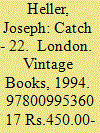

|
|
|
|
|
| Publication |
London, Vintage books, 1994.
|
| Description |
569p.pbk
|
| Standard Number |
9780099536017
|
|
|
|
|
|
|
|
|
|
|
|
Copies: C:1/I:0,R:0,Q:0
Circulation
| Accession# | Call# | Current Location | Status | Policy | Location |
| 060341 | 813.54/HEL 060341 | Main | On Shelf | General | |
|
|
|
|
| 3 |
ID:
147472
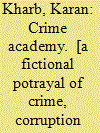

|
|
|
|
|
| Publication |
Noida, Turning Point Publishers, 2016.
|
| Description |
xxii, 296p.Pbk
|
| Standard Number |
9789352671175
|
|
|
|
|
|
|
|
|
|
|
|
Copies: C:1/I:0,R:0,Q:0
Circulation
| Accession# | Call# | Current Location | Status | Policy | Location |
| 058788 | 809.3/KHA 058788 | Main | On Shelf | General | |
|
|
|
|
| 4 |
ID:
096473
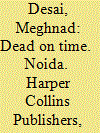

|
|
|
|
|
| Publication |
Noida, Harper Collins Publishers, 2009.
|
| Description |
238p.
|
| Standard Number |
9788172238292, hbk
|
|
|
|
|
|
|
|
|
|
|
|
Copies: C:1/I:0,R:0,Q:0
Circulation
| Accession# | Call# | Current Location | Status | Policy | Location |
| 054980 | 813/DES 054980 | Main | On Shelf | General | |
|
|
|
|
| 5 |
ID:
091470
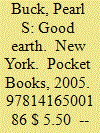

|
|
|
|
|
| Publication |
New York, Pocket Books, 2005.
|
| Description |
xxi, 418p.
|
| Standard Number |
9781416500186
|
|
|
|
|
|
|
|
|
|
|
|
Copies: C:1/I:0,R:0,Q:0
Circulation
| Accession# | Call# | Current Location | Status | Policy | Location |
| 054453 | 823.912/BUC 054453 | Main | On Shelf | General | |
|
|
|
|
| 6 |
ID:
067060


|
|
|
|
|
| Publication |
London, Little, Brown, 2005.
|
| Description |
x, 642p.Pbk
|
| Standard Number |
0316730300
|
|
|
|
|
|
|
|
|
|
|
|
Copies: C:1/I:0,R:0,Q:0
Circulation
| Accession# | Call# | Current Location | Status | Policy | Location |
| 050439 | 813.6/KOS 050439 | Main | On Shelf | General | |
|
|
|
|
| 7 |
ID:
192278
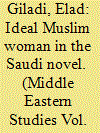

|
|
|
|
|
| Summary/Abstract |
The gender ideology promoted within Saudi political culture constructs a model of the ‘ideal Muslim woman’. This ideal woman is a wife and a mother whose place is in the private sphere, and men are her guardians. Women who remain in their homes, raising the next generation and preserving the traditional values, constitute the quintessential emblem of the unique Saudi national identity. Based on a critical analysis of some 30 Saudi novels written between 1980 and 2000, this study focuses on the changes in the model of the ideal Muslim woman, alongside changes in Saudi attitudes toward women's education and employment. I argue that whereas the regime cultivated the traditional perception of the ideal woman and conservative attitudes toward women's education and employment, the novels presented and constructed hybrid perceptions of these issues, and gradually developed a sharply critical perspective on them.
|
|
|
|
|
|
|
|
|
|
|
|
|
|
|
|
| 8 |
ID:
172374
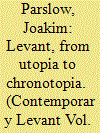

|
|
|
|
|
| Summary/Abstract |
This essay responds to this special issue’s challenge of thinking the Levant through Bakhtin’s notion of the chronotope, with a theoretical reflection on the potentials and limitations of chronotopic thought in social and historical scholarship. The essay is structured around two questions. First, given the overwhelmingly literary associations with which we tend to approach Bakhtin’s thought today, is the chronotope a tool for literary analysis only, or is it applicable to other forms of communication, cognition, and action? Second, what implications does chronotopic analysis have for scholarship that seeks methods of analysing and writing about the Levant in a historically and politically responsive way? Should chronotopes always be understood as the a priori horizon of meaningful narration, as frameworks that make certain plots, events, interpretations, and actions possible while precluding others, or are they also an observable and manipulatable aspect of communication, one that can be subject to the quotidian equivalent of authorial intention, creative reception, and political contestation? Placing the chronotope in the context of Bakhtin’s earlier philosophical project, I argue that although the chronotope facilitates the reflexivity and subversiveness which Bakhtin sees as defining and ethically necessary achievements of modern discourse, these characteristics are both self-limiting and morally ambiguous.
|
|
|
|
|
|
|
|
|
|
|
|
|
|
|
|
| 9 |
ID:
129499
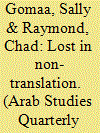

|
|
|
|
|
| Publication |
2014.
|
| Summary/Abstract |
Undergraduate college student in the USA often encounter the Arab Middle East through novels translated into English. These novels are often presented by instructors and understood by students as stylized but accurate depictions of Arab societies as they currently exist. This article argues that the extremely limited number of translated Arabic novels that have made their way into American classrooms perpetuate stereotypes about Arab societies. These novels present student with themes that are often a historical and infused with violence, misogyny, and religious fanaticism. Although students may be highly interested in learning about Arab societies, the literary content they come across encourages affective rather than critical or complex responses.
|
|
|
|
|
|
|
|
|
|
|
|
|
|
|
|
| 10 |
ID:
178106
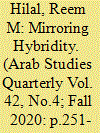

|
|
|
|
|
| Summary/Abstract |
This article explores the way in which Laila Halaby in Once in a Promised Land and Alia Yunis in The Night Counter utilize the Arab folk tradition in novels on Arab and Muslim American experience to counter the dominant narrative that simultaneously erases their extensive history in the United States and juxtaposes it with a forced visibility that is marked by Otherness, threat, and distrust. The article argues that by using folkloric figures and storytelling structures, Halaby and Yunis reverse the positionality of these communities by marking the multiple cultural signifiers that inform their stories in order to construct a palimpsest that reinscribes Arab and Muslim American experiences within narratives that perceive them as problems. As such, the Arab folk tradition emerges as a significant mode in the cultural memory of Arab and Muslim Americans, and the American literary fabric more broadly, and takes on a new meaning in this context.
|
|
|
|
|
|
|
|
|
|
|
|
|
|
|
|
| 11 |
ID:
125287


|
|
|
|
|
| Publication |
Noida, Random House Publishers India Private Limited, 2010.
|
| Description |
256p.Pbk
|
| Standard Number |
9788184001426
|
|
|
|
|
|
|
|
|
|
|
|
Copies: C:1/I:0,R:0,Q:0
Circulation
| Accession# | Call# | Current Location | Status | Policy | Location |
| 057495 | 808.83/WAG 057495 | Main | On Shelf | General | |
|
|
|
|
|
|
|
|
|